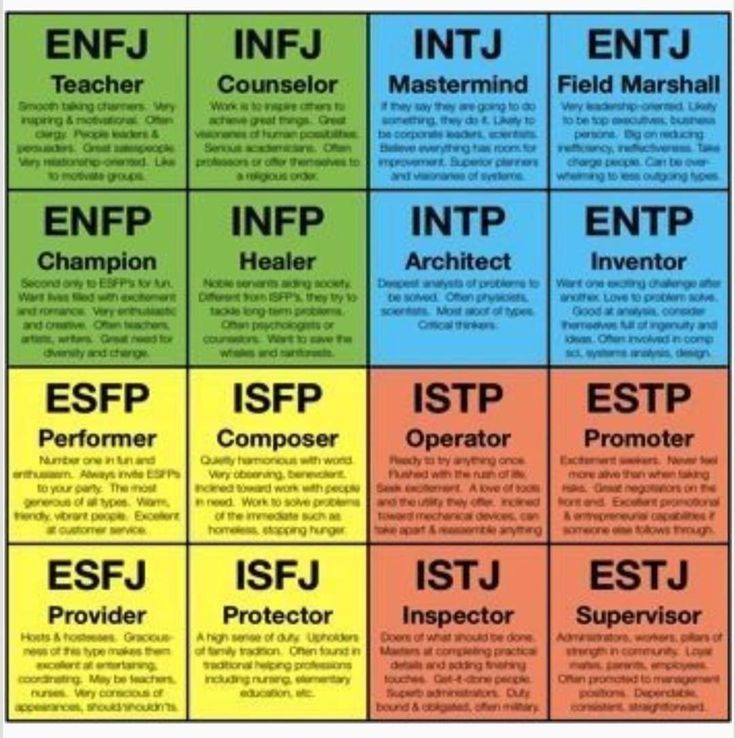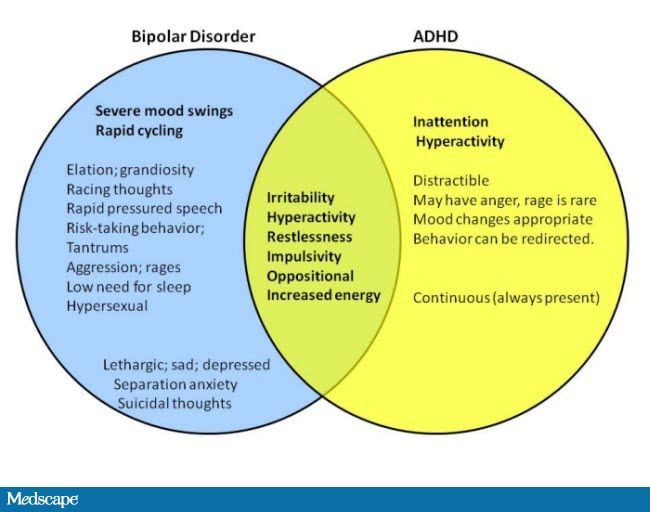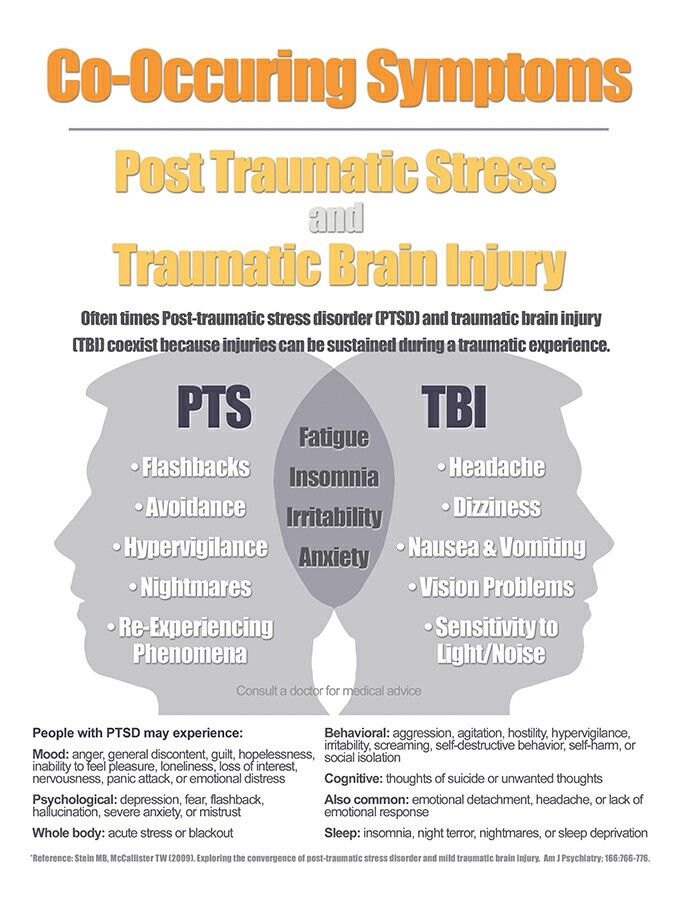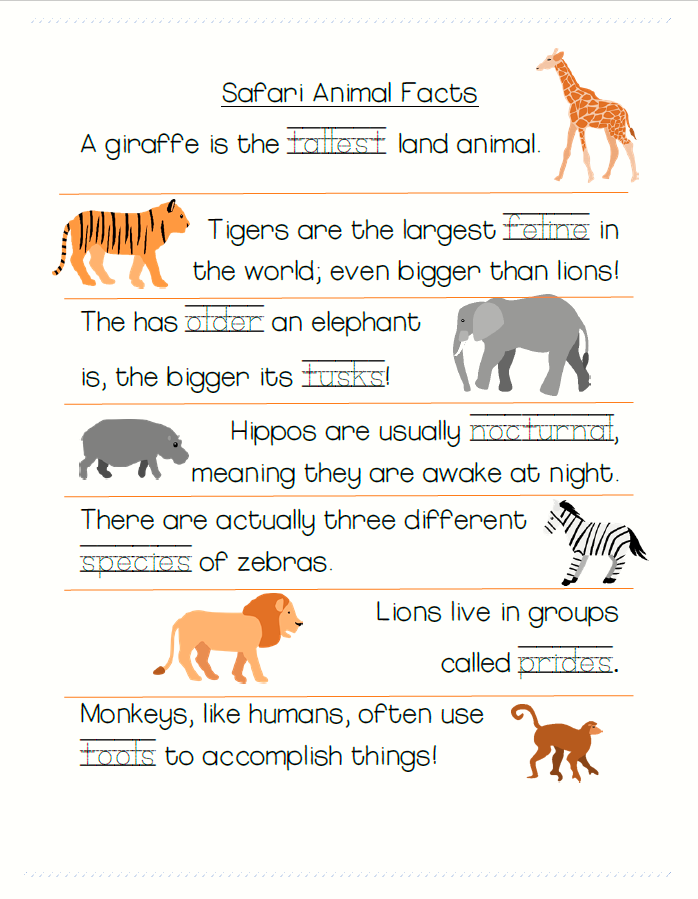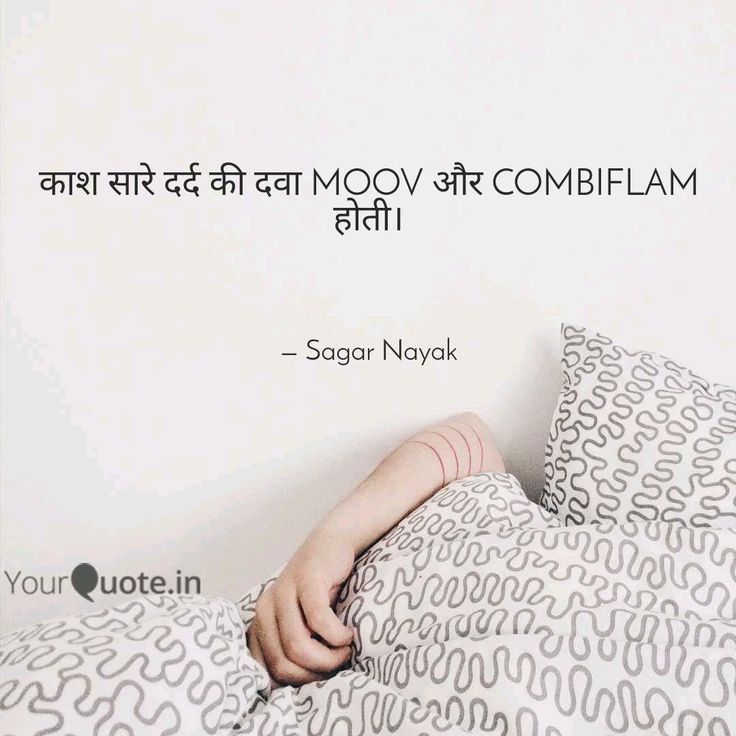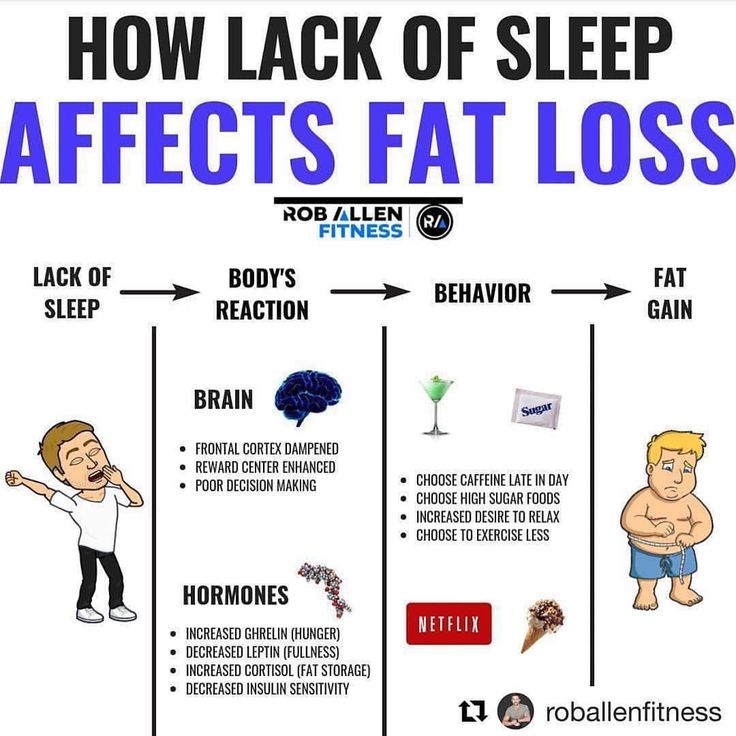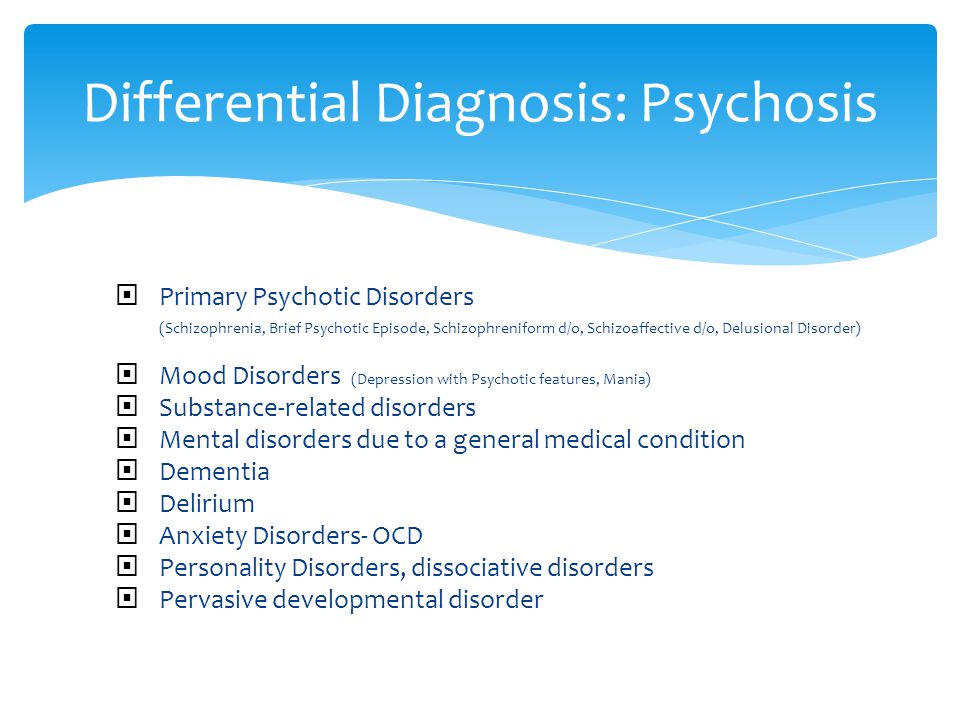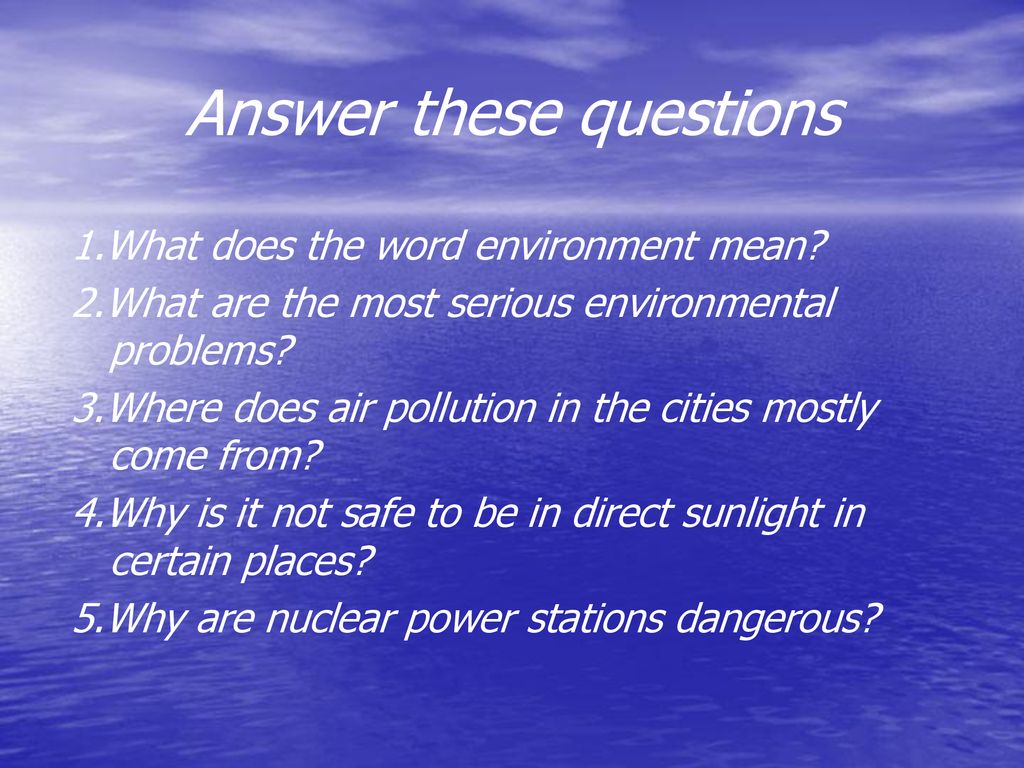Myers personality test types
The Myers & Briggs Foundation
ISTJ
Quiet, serious, earn success by thoroughness and dependability. Practical, matter-of-fact, realistic, and responsible. Decide logically what should be done and work toward it steadily, regardless of distractions. Take pleasure in making everything orderly and organized - their work, their home, their life. Value traditions and loyalty.
ISFJ
Quiet, friendly, responsible, and conscientious. Committed and steady in meeting their obligations. Thorough, painstaking, and accurate. Loyal, considerate, notice and remember specifics about people who are important to them, concerned with how others feel. Strive to create an orderly and harmonious environment at work and at home.
INFJ
Seek meaning and connection in ideas, relationships, and material
possessions. Want to understand what motivates people and are
insightful about others. Conscientious and committed to their
firm values. Develop a clear vision about how best to serve the
common good. Organized and decisive in implementing their vision.
INTJ
Have original minds and great drive for implementing their ideas and achieving their goals. Quickly see patterns in external events and develop long-range explanatory perspectives. When committed, organize a job and carry it through. Skeptical and independent, have high standards of competence and performance - for themselves and others.
ISTP
Tolerant and flexible, quiet observers until a problem appears,
then act quickly to find workable solutions. Analyze what makes
things work and readily get through large amounts of data to isolate
the core of practical problems. Interested in cause and effect,
organize facts using logical principles, value efficiency.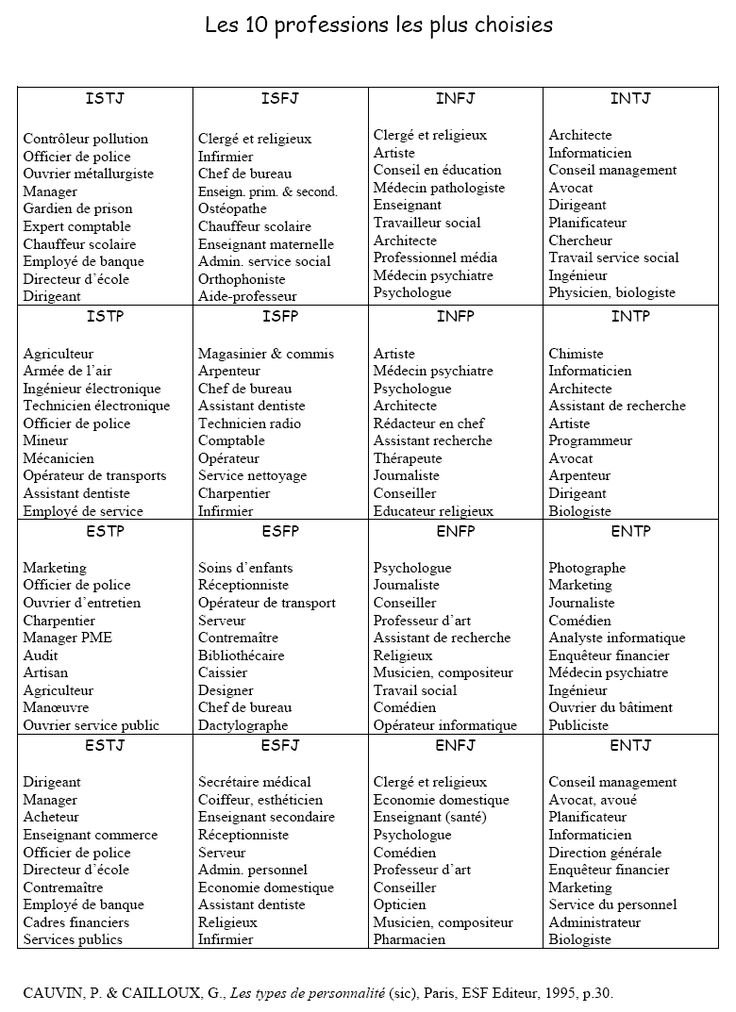
ISFP
Quiet, friendly, sensitive, and kind. Enjoy the present moment, what's going on around them. Like to have their own space and to work within their own time frame. Loyal and committed to their values and to people who are important to them. Dislike disagreements and conflicts, do not force their opinions or values on others.
INFP
Idealistic, loyal to their values and to people who are important to them. Want an external life that is congruent with their values. Curious, quick to see possibilities, can be catalysts for implementing ideas. Seek to understand people and to help them fulfill their potential. Adaptable, flexible, and accepting unless a value is threatened.
INTP
Seek to develop logical explanations for everything that interests
them. Theoretical and abstract, interested more in ideas than
in social interaction. Quiet, contained, flexible, and adaptable.
Have unusual ability to focus in depth to solve problems in their
area of interest. Skeptical, sometimes critical, always analytical.
Quiet, contained, flexible, and adaptable.
Have unusual ability to focus in depth to solve problems in their
area of interest. Skeptical, sometimes critical, always analytical.
ESTP
Flexible and tolerant, they take a pragmatic approach focused on immediate results. Theories and conceptual explanations bore them - they want to act energetically to solve the problem. Focus on the here-and-now, spontaneous, enjoy each moment that they can be active with others. Enjoy material comforts and style. Learn best through doing.
ESFP
Outgoing, friendly, and accepting. Exuberant lovers of life,
people, and material comforts. Enjoy working with others to make
things happen. Bring common sense and a realistic approach to
their work, and make work fun. Flexible and spontaneous, adapt
readily to new people and environments.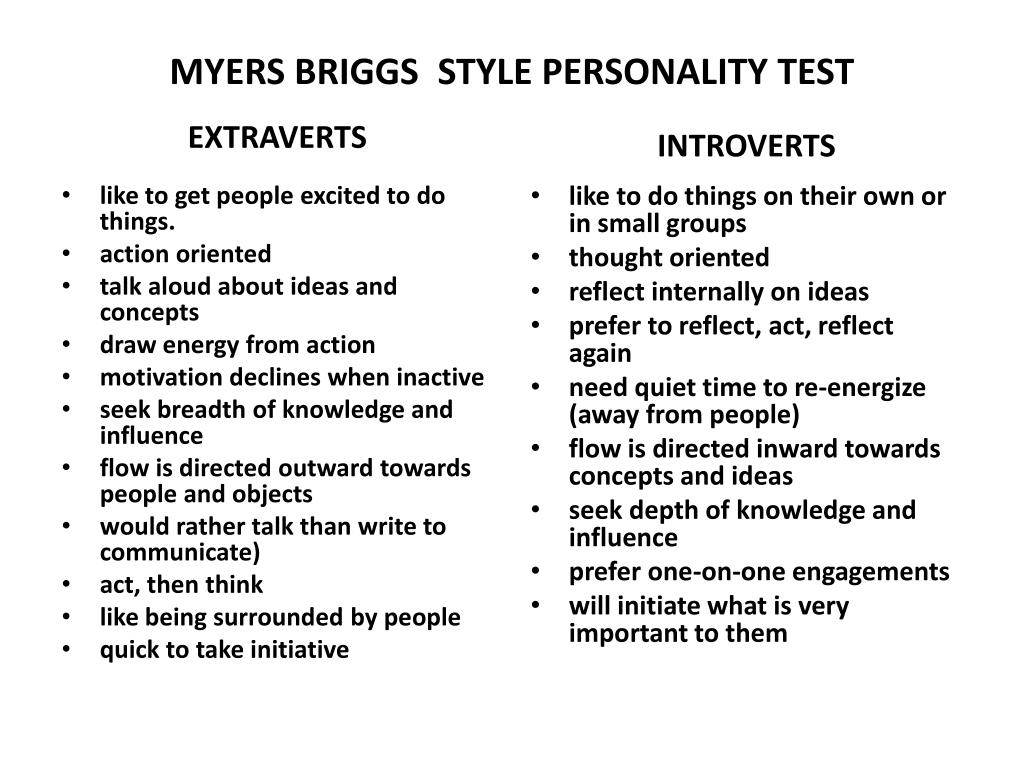 Learn best by trying a
new skill with other people.
Learn best by trying a
new skill with other people.
ENFP
Warmly enthusiastic and imaginative. See life as full of possibilities. Make connections between events and information very quickly, and confidently proceed based on the patterns they see. Want a lot of affirmation from others, and readily give appreciation and support. Spontaneous and flexible, often rely on their ability to improvise and their verbal fluency.
ENTP
Quick, ingenious, stimulating, alert, and outspoken. Resourceful in solving new and challenging problems. Adept at generating conceptual possibilities and then analyzing them strategically. Good at reading other people. Bored by routine, will seldom do the same thing the same way, apt to turn to one new interest after another.
ESTJ
Practical, realistic, matter-of-fact. Decisive, quickly move
to implement decisions.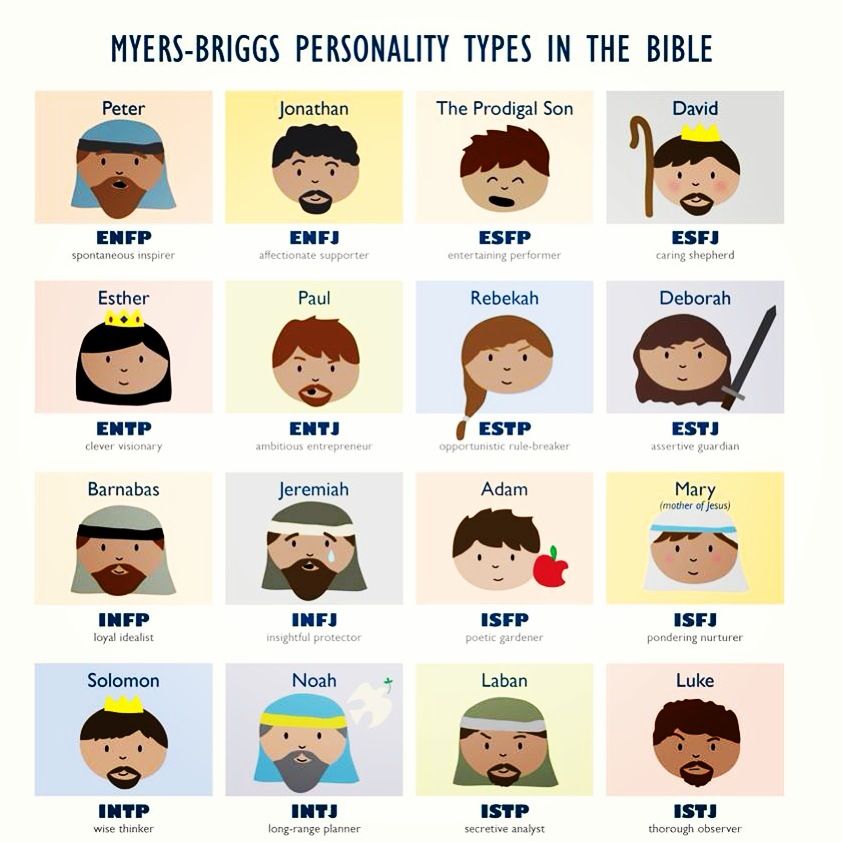 Organize projects and people to get things
done, focus on getting results in the most efficient way possible.
Take care of routine details. Have a clear set of logical standards,
systematically follow them and want others to also. Forceful in
implementing their plans.
Organize projects and people to get things
done, focus on getting results in the most efficient way possible.
Take care of routine details. Have a clear set of logical standards,
systematically follow them and want others to also. Forceful in
implementing their plans.
ESFJ
Warmhearted, conscientious, and cooperative. Want harmony in their environment, work with determination to establish it. Like to work with others to complete tasks accurately and on time. Loyal, follow through even in small matters. Notice what others need in their day-by-day lives and try to provide it. Want to be appreciated for who they are and for what they contribute.
ENFJ
Warm, empathetic, responsive, and responsible. Highly attuned
to the emotions, needs, and motivations of others. Find potential
in everyone, want to help others fulfill their potential.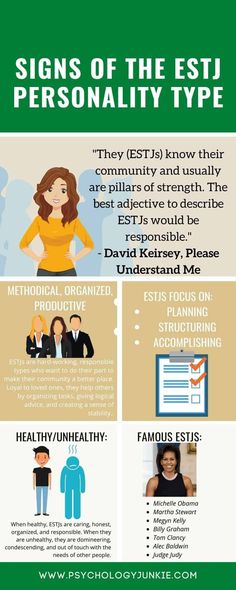 May
act as catalysts for individual and group growth. Loyal, responsive
to praise and criticism. Sociable, facilitate others in a group,
and provide inspiring leadership.
May
act as catalysts for individual and group growth. Loyal, responsive
to praise and criticism. Sociable, facilitate others in a group,
and provide inspiring leadership.
ENTJ
Frank, decisive, assume leadership readily. Quickly see illogical and inefficient procedures and policies, develop and implement comprehensive systems to solve organizational problems. Enjoy long-term planning and goal setting. Usually well informed, well read, enjoy expanding their knowledge and passing it on to others. Forceful in presenting their ideas.
Excerpted from Introduction to Type® by Isabel Briggs Myers published by The Myers-Briggs Company. Used with permission.
Myers & Briggs' 16 Personality Types
Explore our in-depth descriptions of each of the 16 personality types to learn more about yourself and your loved ones. Or, if you're not sure which personality type fits you, take our free personality test .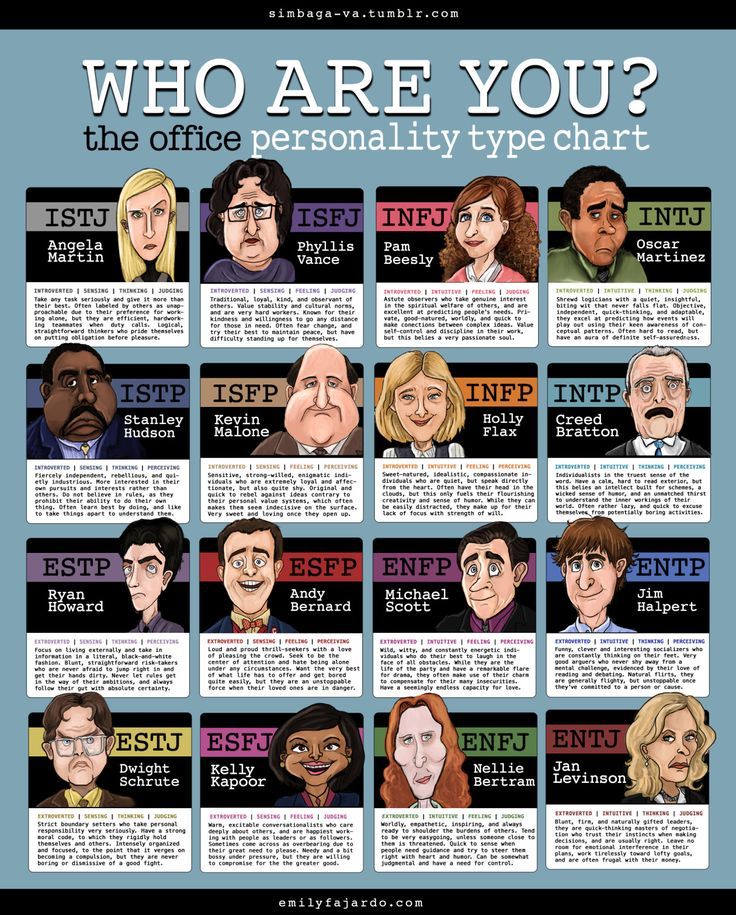
The 16 personality types were created by Isabel Myers and Katharine Briggs, developers of the MBTI® assessment. Myers and Briggs created their personality typology to help people discover their own strengths and gain a better understanding of how people are different.
When you discover your own personality type, you'll understand more clearly why you do the things you do. You will gain confidence in your strengths and be better able to make decisions that suit your true nature.
Find Your Type
INFP
The Healer
INFPs are imaginative idealists, guided by their own core values and beliefs. To a Healer, possibilities are paramount; the reality of the moment is only of passing concern. They see potential for a better future, and pursue truth and meaning with their own flair.
INTJ
The Mastermind
INTJs are analytical problem-solvers, eager to improve systems and processes with their innovative ideas. They have a talent for seeing possibilities for improvement, whether at work, at home, or in themselves.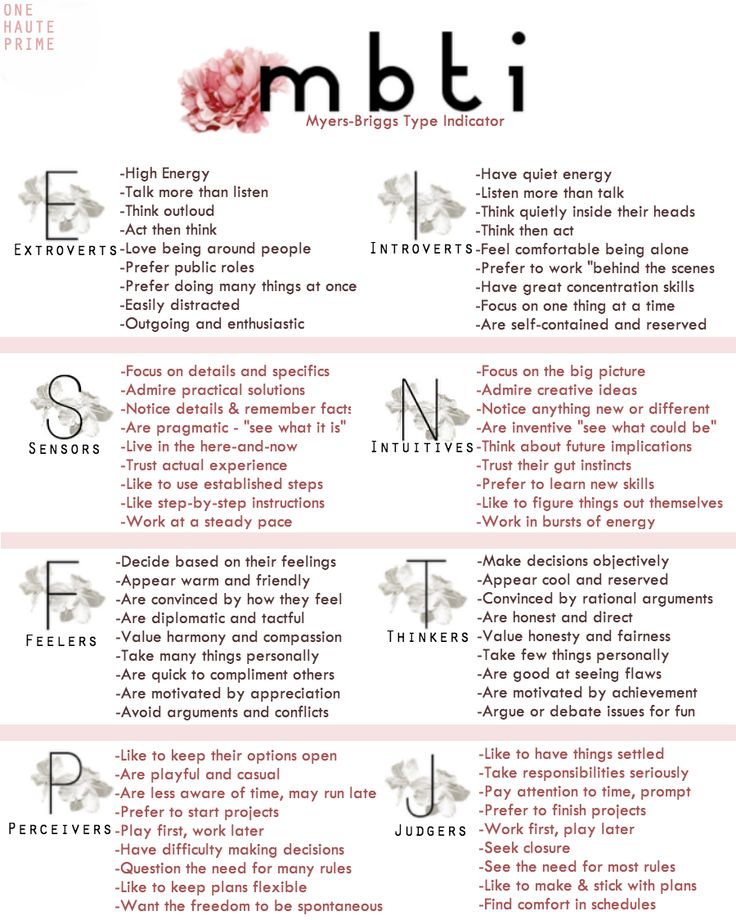
INFJ
The Counselor
INFJs are creative nurturers with a strong sense of personal integrity and a drive to help others realize their potential. Creative and dedicated, they have a talent for helping others with original solutions to their personal challenges.
INTP
The Architect
INTPs are philosophical innovators, fascinated by logical analysis, systems, and design. They are preoccupied with theory, and search for the universal law behind everything they see. They want to understand the unifying themes of life, in all their complexity.
ENFP
The Champion
ENFPs are people-centered creators with a focus on possibilities and a contagious enthusiasm for new ideas, people and activities. Energetic, warm, and passionate, ENFPs love to help other people explore their creative potential.
ENTJ
The Commander
ENTJs are strategic leaders, motivated to organize change. They are quick to see inefficiency and conceptualize new solutions, and enjoy developing long-range plans to accomplish their vision.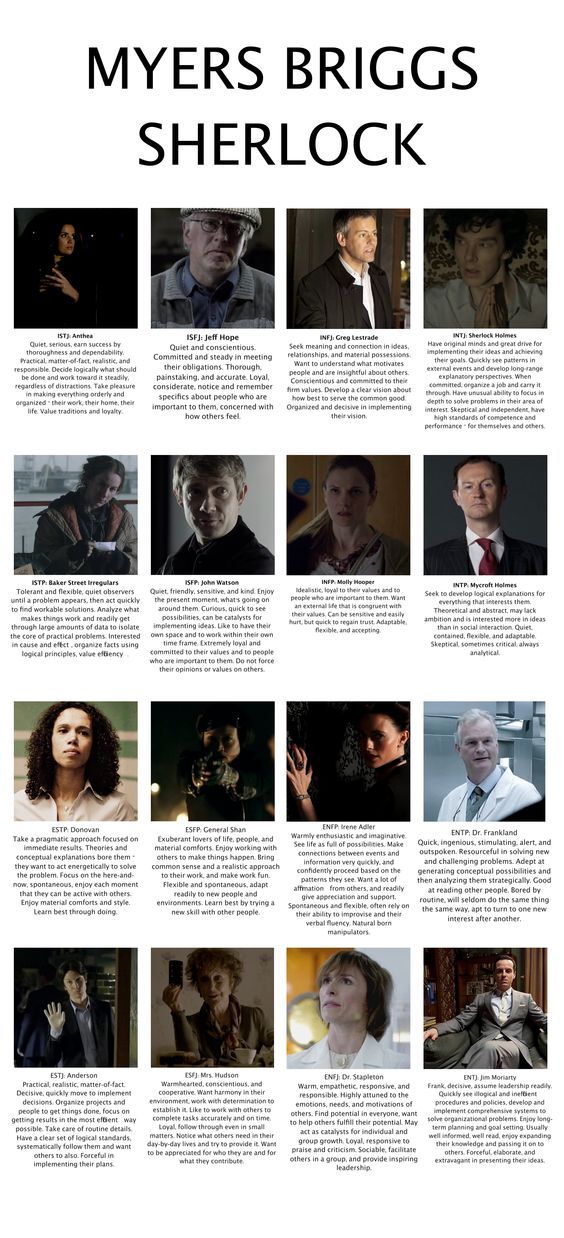 They excel at logical reasoning and are usually articulate and quick-witted.
They excel at logical reasoning and are usually articulate and quick-witted.
ENTP
The Visionary
ENTPs are inspired innovators, motivated to find new solutions to intellectually challenging problems. They are curious and clever, and seek to comprehend the people, systems, and principles that surround them.
ENFJ
The Teacher
ENFJs are idealist organizers, driven to implement their vision of what is best for humanity. They often act as catalysts for human growth because of their ability to see potential in other people and their charisma in persuading others to their ideas.
ISFJ
The Protector
ISFJs are industrious caretakers, loyal to traditions and organizations. They are practical, compassionate, and caring, and are motivated to provide for others and protect them from the perils of life.
ISFP
The Composer
ISFPs are gentle caretakers who live in the present moment and enjoy their surroundings with cheerful, low-key enthusiasm. They are flexible and spontaneous, and like to go with the flow to enjoy what life has to offer.
They are flexible and spontaneous, and like to go with the flow to enjoy what life has to offer.
ISTJ
The Inspector
ISTJs are responsible organizers, driven to create and enforce order within systems and institutions. They are neat and orderly, inside and out, and tend to have a procedure for everything they do.
ISTP
The Craftsperson
ISTPs are observant artisans with an understanding of mechanics and an interest in troubleshooting. They approach their environments with a flexible logic, looking for practical solutions to the problems at hand.
ESFJ
The Provider
ESFJs are conscientious helpers, sensitive to the needs of others and energetically dedicated to their responsibilities. They are highly attuned to their emotional environment and attentive to both the feelings of others and the perception others have of them.
ESFP
The Performer
ESFPs are vivacious entertainers who charm and engage those around them.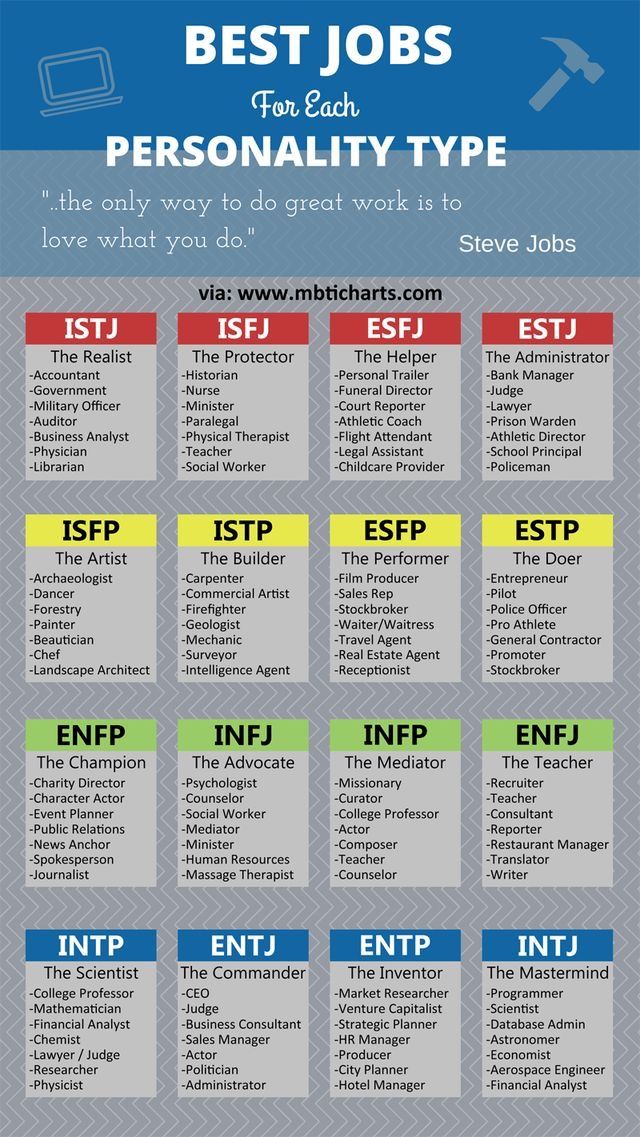 They are spontaneous, energetic, and fun-loving, and take pleasure in the things around them: food, clothes, nature, animals, and especially people.
They are spontaneous, energetic, and fun-loving, and take pleasure in the things around them: food, clothes, nature, animals, and especially people.
ESTJ
The Supervisor
ESTJs are hardworking traditionalists, eager to take charge in organizing projects and people. Orderly, rule-abiding, and conscientious, ESTJs like to get things done, and tend to go about projects in a systematic, methodical way.
ESTP
The Dynamo
ESTPs are energetic thrillseekers who are at their best when putting out fires, whether literal or metaphorical. They bring a sense of dynamic energy to their interactions with others and the world around them.
Personality typing is a system of categorizing people according to their tendencies to think and act in particular ways. Personality typing attempts to find the broadest, most important ways in which people are different, and make sense of these differences by sorting people into meaningful groups.
What is personality typing?
The personality types described here were created by Isabel Briggs Myers and her mother, Katharine Briggs, in the 1960's.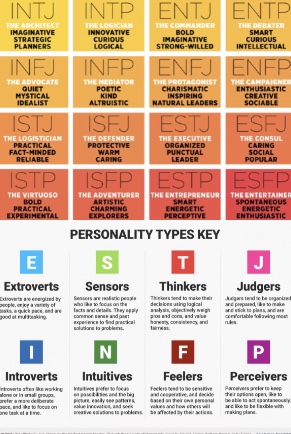 Their theories were based on the work of psychologist Carl Jung, although they extended his ideas to create a more complete framework of personality typing. Myers and Briggs proposed that there were four key dimensions that could be used to categorize people:
Their theories were based on the work of psychologist Carl Jung, although they extended his ideas to create a more complete framework of personality typing. Myers and Briggs proposed that there were four key dimensions that could be used to categorize people:
- Introversion vs. Extraversion
- Sensing vs. Intuition
- Thinking vs. Feeling
- Judging vs. Perceiving
Each of the four dimensions was described as a dichotomy, or an either/or choice between two styles of being. Myers and Briggs described this as a "preference" and proposed that any individual should be able to identify a preferred style on each of the four dimensions. The sum of a person's four preferred styles becomes their personality type.
Myers and Briggs theorized that our preferences on each of the four dimensions would combine to create predictable patterns in thought and behavior, so that people with the same four preferences would share many commonalities in the way they approach their lives, from the hobbies they choose to the work that might suit them.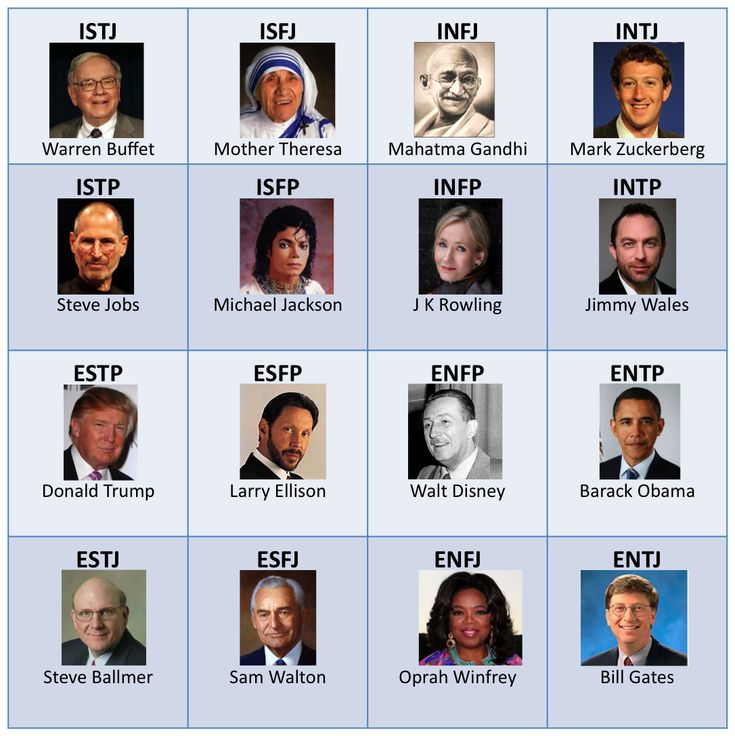
What is the meaning of the four letters in a personality type?
Each of the four letters in a personality type code stands for a preference in your style of thinking or behaving.
I/E: Introversion or Extraversion
The Introversion/Extraversion dimension describes how a person manages their energy.
Introverts are energized by spending quiet time alone or with a small group. They tend to be more reserved and thoughtful.
Extraverts are energized by spending time with people and in busy, active surroundings. They tend to be more expressive and outspoken.
S/N: Sensing or iNtuition
The Sensing/Intuition dimension describes how an individual processes information.
Sensors focus on their five senses and are interested in information they can directly see, hear, feel, and so on. They tend to be hands-on learners and are often described as "practical."
Intuitives focus on a more abstract level of thinking; they are more interested in theories, patterns, and explanations.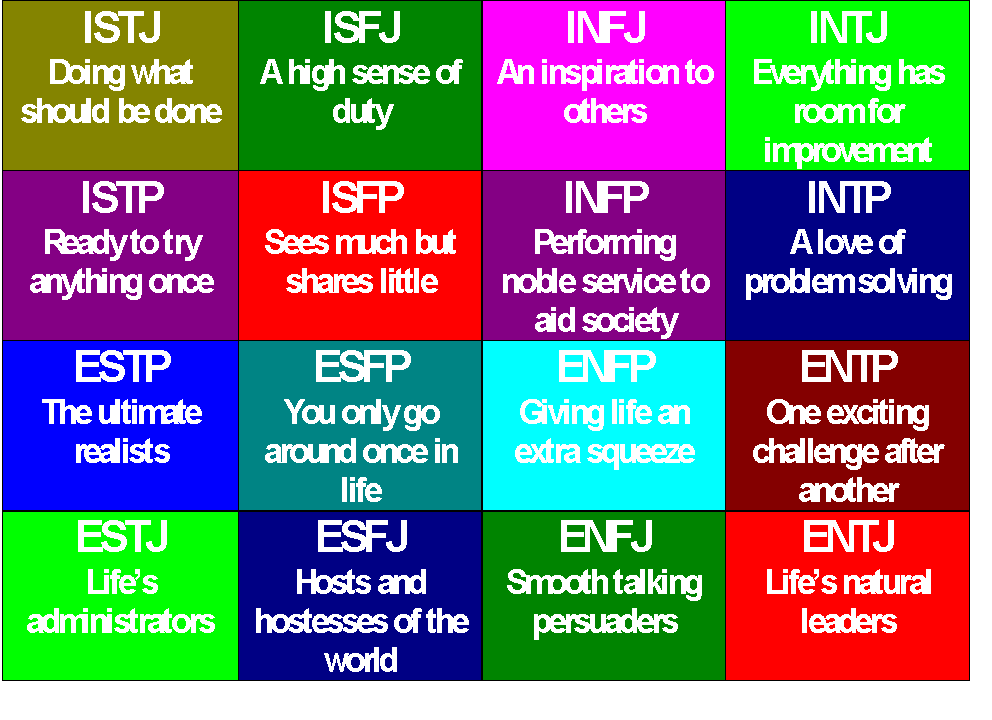 They are often more concerned with the future than the present and are often described as "creative."
They are often more concerned with the future than the present and are often described as "creative."
T/F: Thinking or Feeling
The Thinking/Feeling dimension describes how people make decisions.
Thinkers tend to make decisions with their heads; they are interested in finding the most logical, reasonable choice.
Feelers tend to make decisions with their hearts; they are interested in how a decision will affect people, and whether it fits in with their values.
J/P: Judging or Perceiving
The Judging/Perceiving dimension describes how people approach structure in their lives.
Judgers appreciate structure and order; they like things planned, and dislike last-minute changes.
Perceivers appreciate flexibility and spontaneity; they like to leave things open so they can change their minds.
How do I know which personality type I am?
Easy—take our in-depth personality type test!
THE FINE PRINT: Myers-Briggs® and MBTI® are registered trademarks of the MBTI Trust, Inc.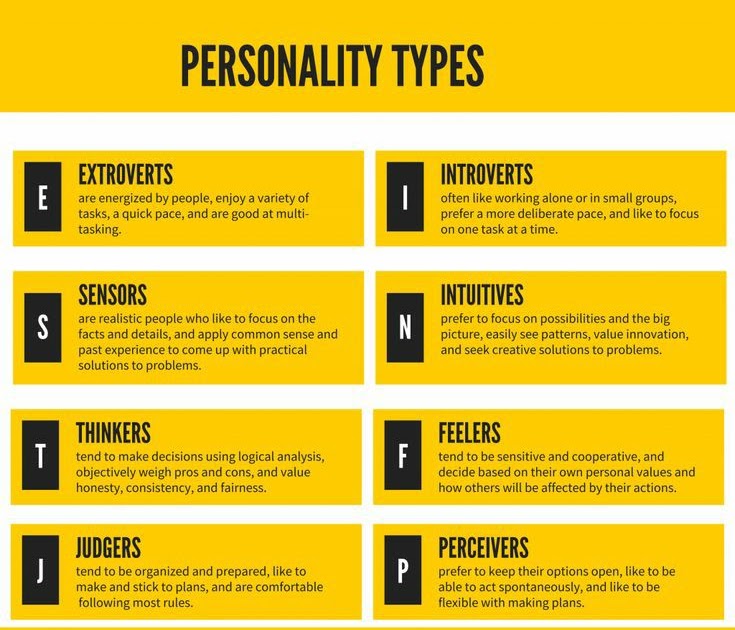 , which has no affiliation with this site. Truity offers a free personality test based on Myers and Briggs' types, but does not offer the official MBTI® assessment. For more information on the Myers Briggs Type Indicator® assessment, please go here.
, which has no affiliation with this site. Truity offers a free personality test based on Myers and Briggs' types, but does not offer the official MBTI® assessment. For more information on the Myers Briggs Type Indicator® assessment, please go here.
Definition and Examples • BUOM
By Indeed Editorial Team
December 29, 2021
Many employers use personality tests as part of the hiring process to assess a candidate's worldview, behavior, and acclimatization to company culture. In this article, we'll discuss what a personality type test is, which ones are some of the most popular, and what you can do to prepare for them.
What is a personality type test?
The Personality Test is an introspective self-report questionnaire that helps you assess your personality and behavioral tendencies. There are many personality tests that you can access online, and some are conducted in the workplace to evaluate job applicants.
Employers often use the results of personality tests to determine if a candidate is a good fit for the company and/or what roles these candidates may fill in the company.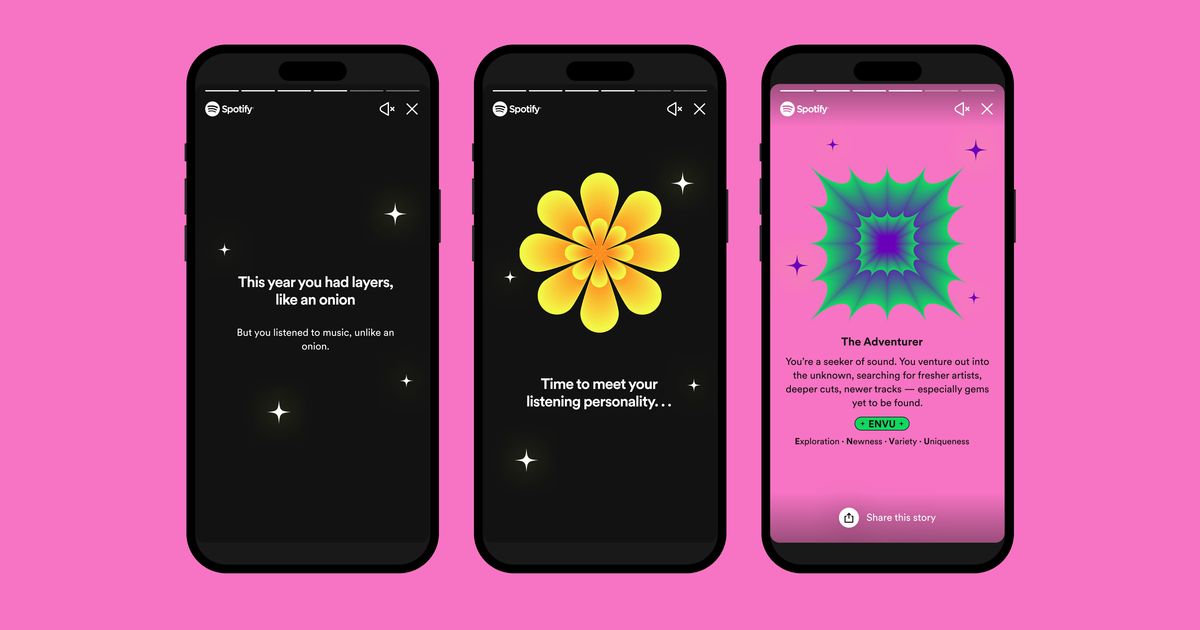 Alternatively, businesses can use these employee tests to evaluate teams and their ability to work together.
Alternatively, businesses can use these employee tests to evaluate teams and their ability to work together.
What types of personality tests are there?
There are many types of personality tests, but most are based on the Myers-Briggs Type Index. Other popular types of personality tests are the NEO Personality Inventory Revised (NEO PI-R) and the Winslow Personality Profile.
Myers-Briggs Type Indicator
Myers-Briggs Type Indicator (MBTI) was first developed by Katherine Cooke Briggs and her daughter Isabelle Briggs Myers. Modern tests using the MBTI are based on the theory of the Swiss psychiatrist Carl Jung, who believed that people interact with each other in four psychological areas (sensing, intuition, feeling and thinking) and that one of them dominates in each person.
Many tests that use MBTI test takers in four areas:
-
Extraversion (E) and Introversion (I)
-
Sensing (S) versus Intuition (N)
-
Thinking (T) and Feeling (T) (F)
-
Judgment (J) vs Perception (P)
Based on the results, people who take these tests will have one of 16 personality types: ESTJ, ESFJ, ESTP, ESFP, ISTJ, ISTP , ISFJ, ISFP, ENTJ, ENFJ, ENTP, ENFP, INTJ, INTP, INFJ, and INFP.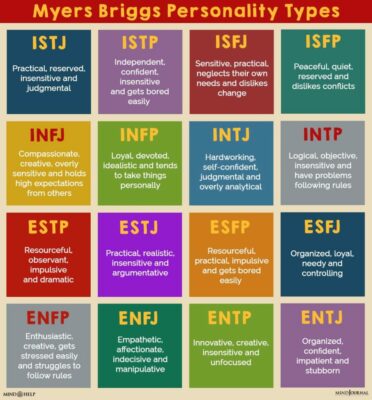 . You may have different scores each time you take the test, but if you're an introvert or extrovert, this part of the score usually stays the same.
. You may have different scores each time you take the test, but if you're an introvert or extrovert, this part of the score usually stays the same.
Many people associate each of these personalities with professions and industries. For example, someone with an INFP personality is considered artistic and likely has a job that uses their creativity.
Related: Manual: Myers-Briggs Type Indicator: 16 Personality Types
NEO Personality Inventory Revised (NEO PI-R)
By the 1980s, Paul Costa and Robert McCray developed the NEO Personality Inventory. Their first inventory included only three personality traits: neuroticism, extraversion, and openness to new experiences. They later revised their list to include benevolence (A) and conscientiousness (C). Today, the revised NEO Personality Inventory (NEO PI-R) evaluates five personality traits of test subjects, each of which has six subcategories:
-
Neuroticism: Its subcategories are anxiety, hostility, depression, shyness, impulsivity, and vulnerability to stress.
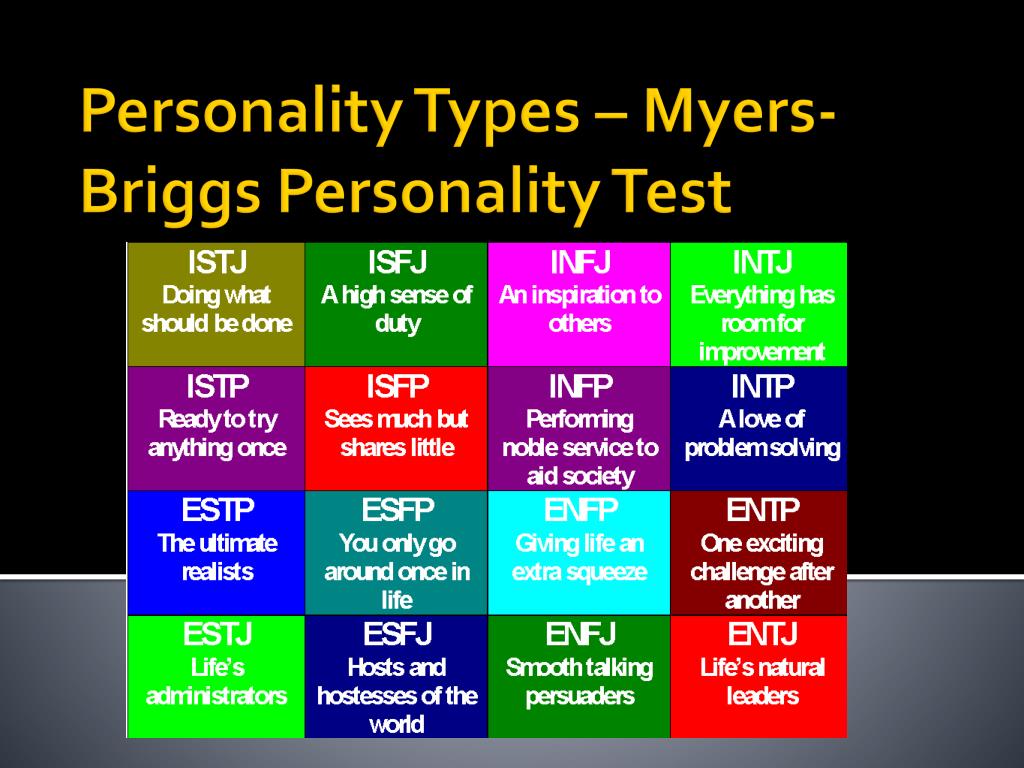
-
Extraversion: its subcategories are warmth, sociability, assertiveness, activity, thrill seeking and positive emotions.
-
Openness to experience: its subcategories are fantasies, aesthetics, feelings, actions, ideas and values.
-
Benevolentness: Its subcategories are trust, straightforwardness, altruism, compliance, modesty, and gentleness.
-
Integrity: its subcategories are competence, order, diligence, striving for achievement, self-discipline, and deliberation.
Winslow Personality Profile
Winslow Personality Profile measures 24 personality traits on a decile scale. This test is popular with sports leagues such as Major League Baseball and the National Hockey League. People can take the test online, but they must pay a fee or use a company-provided password to access the test.
How to prepare for a pre-employment personality test
Personality tests are usually administered by or on behalf of companies at the beginning of the job selection process. If you must take such a test, you are advised to answer each question honestly.
If you must take such a test, you are advised to answer each question honestly.
Although you can only find out what questions are on the test as you take it, you can find ways to practice your personality tests. There are many available online that can offer results and analysis. Many resources are free, but some offer deeper assessments for a fee.
Be aware that there are many facets to your personality and your behavior may change depending on the situation you are in. In particular, you may behave in one way in ordinary social situations, but behave differently in a professional environment. This should be your mindset when you take a personality test for a company.
Another thing you must remember is to be decisive. Some personality tests have multiple choice questions or true or false answers, while others require you to rate how you feel about certain statements or how close they relate to you. The last type of test measures your decisiveness most accurately, so you may benefit from choosing extreme options (for example, strongly agree or strongly disagree).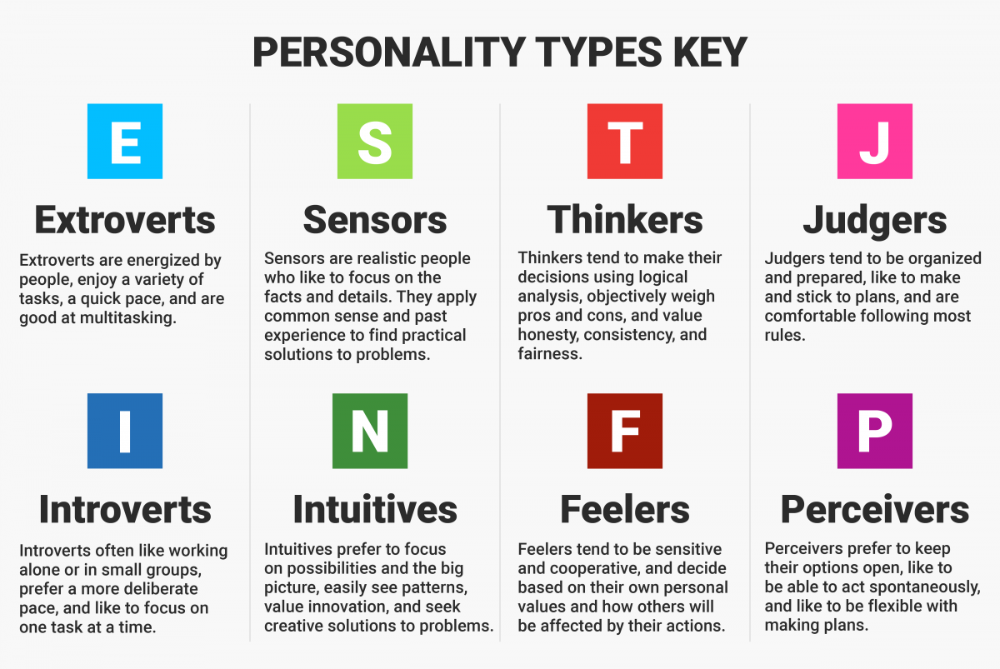
Also, take your time. Don't feel compelled to rush your answers, but keep going at a steady pace to show that you're thinking about the questions and giving them the attention they deserve. It also shows that you are good at coping with stress.
Sample Personality Test Questions
Some personality test questions assess how you will act in social situations, while others may be specific to your industry or position.
MBTI questions
Many of the MBTI-based Personality Test questions assess how you will act in social situations, how you perceive the world, and your ability to improvise. Most questions have two answers.
Example 1: When I am assigned a cool project, I would prefer to…
-
Group work
-
Self-employed
Example 2: If I suddenly think about going to the beach…
-
I'll just go right after I form the idea in my mind
-
I'll only go after I plan my trip and check the weather and traffic reports.
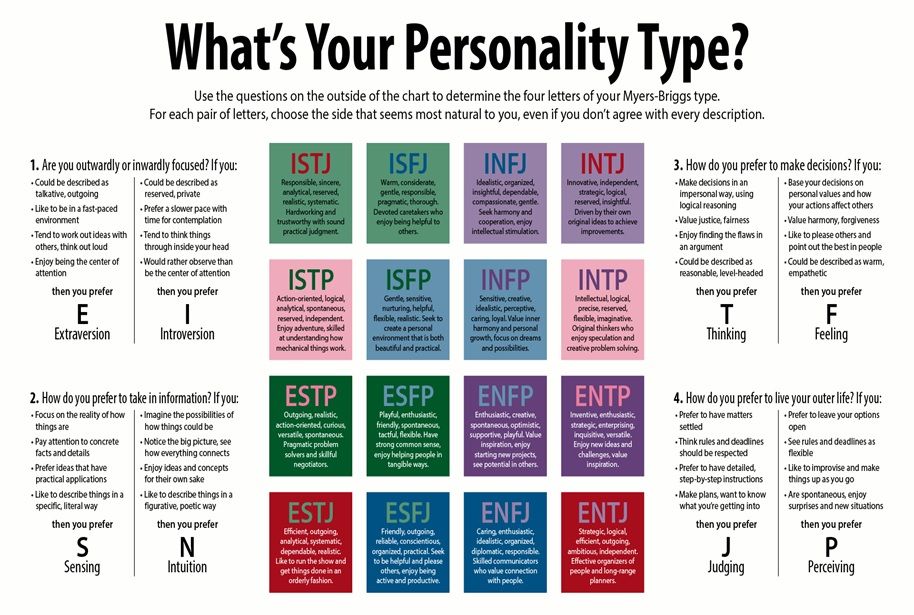
Depending on the score, some MBTI questions are true and false.
Example 3: I would rather spend my free time socializing and going to parties. Example 4: When I was given a task, I would have liked to have received full instructions before starting.
Deeper personality assessments may ask you to rate how you feel about certain statements on a scale.
Example 5: I first say “Hi” when I meet someone or I see someone nearby
-
Always
-
often
-
Most jobs require applicants to take a personality test, so make this part of your preparation. Take a few personality tests on your own, but be sure to highlight your professionalism when you take the personality test for the company.
Jung and Briggs-Myers Personality Test
This free personality test will determine your four-letter personality type based on Jung's typology, as developed by Myers, Briggs, von Franz and van der Hoop.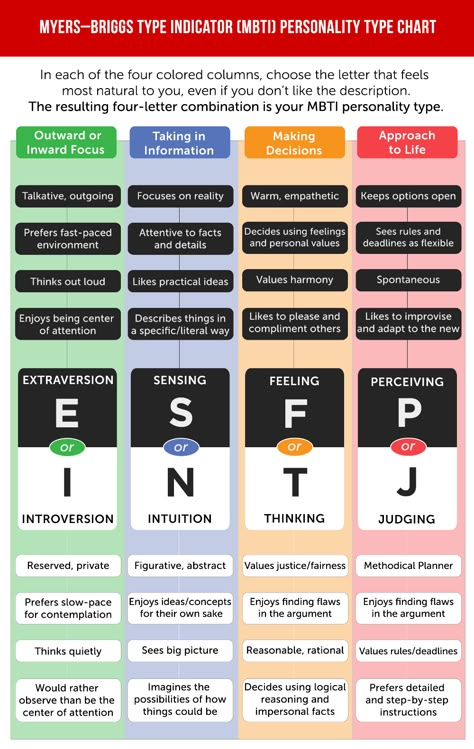 Our test is one of several ways to determine your Jungian personality type that is similar, but not identical, to the MBTI (Myers-Briggs Type Indicator) ® MBTI), the Jung Type Indicator and related materials.
Our test is one of several ways to determine your Jungian personality type that is similar, but not identical, to the MBTI (Myers-Briggs Type Indicator) ® MBTI), the Jung Type Indicator and related materials.
The IDR Labs Personality Test is the property of IDR Labs International.
Our test is one of the few free tests of this type that is statistically controlled and reliable. Despite this, please note that the test is only a kind of indicator that can only roughly determine your inherent qualities.
The Myers & Briggs Type Indicator and MBTI test trademarks are owned by the Myers & Briggs Foundation, the United States of America and other countries. The MBTI test was published by The Myers-Briggs. The Young Type Indicator is owned by Psytech International.
All personality tests, whether they are official tests like the MBTI® (Myers-Briggs Type Indicator) and Jung Type Indicator tests, or free online tests like this one, are only indicators that can only tentatively determine your personality type.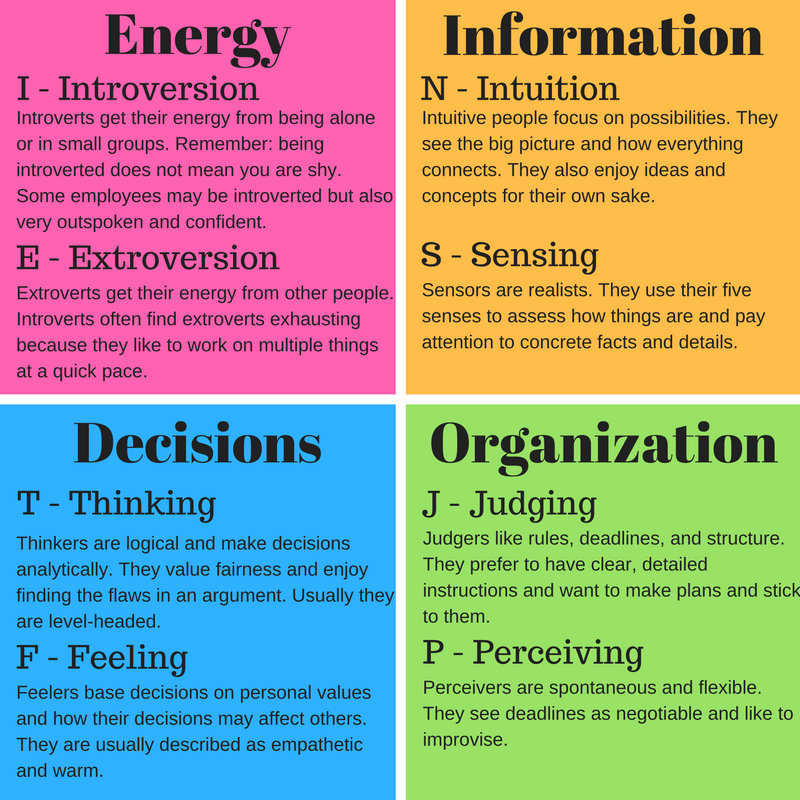 None of the tests can determine your personality type with absolute accuracy and reliability and replace a detailed study of the works of Myers, Briggs, von Franz, van der Hoop and Jung.
None of the tests can determine your personality type with absolute accuracy and reliability and replace a detailed study of the works of Myers, Briggs, von Franz, van der Hoop and Jung.
As the publishers of this free online personality test by Jung, Myers, Briggs, von Franz and van der Hoop, we have made every effort to ensure that this test is accurate, complete and reliable.
Like the "official" Jung typology tests and other professionally designed tests, our free online test has been statistically controlled and extensively reviewed to ensure maximum accuracy of results.
To create this test, we used the typology of C. G. Jung's psychological types presented in his work Psychological types and the typology of Isabelle Briggs Myers, co-author of the MBTI® test, which she published in her work Everyone has their own gift . In addition, van der Hoop's works Orientation of consciousness and Character and subconsciousness also had a significant influence on the creation of this test.